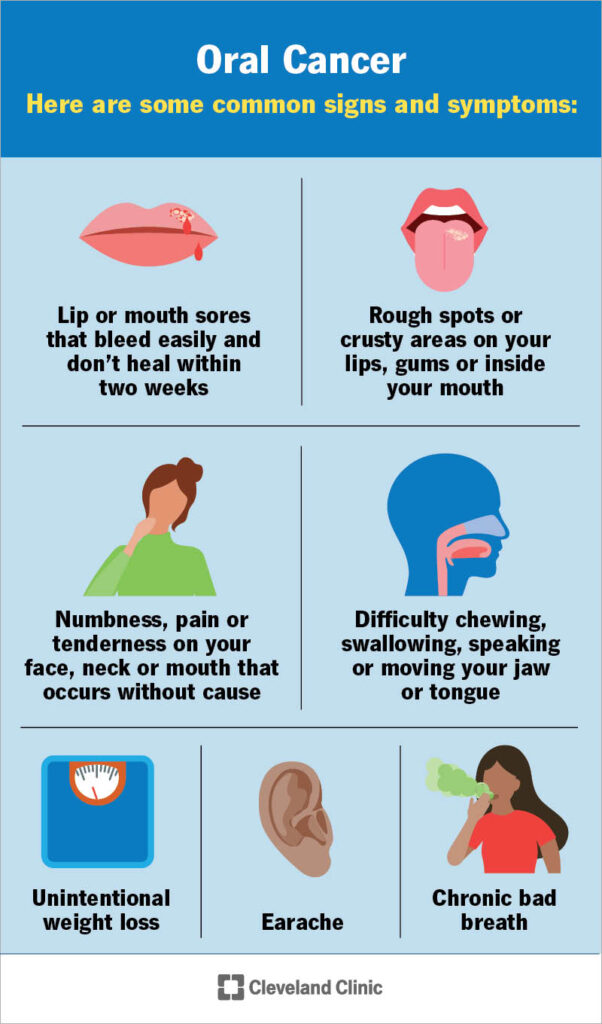Source: Cleveland Clinic
CAUSES AND RISKS:
Heavy alcohol consumption is another significant risk factor for developing oral cancer especially when combined with tobacco use.
Human papillomavirus-HPV infection particularly HPV type 16 has also been linked to an increased risk of oral cancer.
Factors that may increase the risk of developing oral cancer include excessive sun exposure to the lips, diet low in fruits and vegetables, poor oral hygiene and a weakened immune system.
SYMPTOMS:
Early stage oral cancer may not cause any noticeable symptoms which is why regular dental checkups are essential for early detection.
Common symptoms of oral cancer may include persistent mouth soreness that leads to pain or discomfort in the mouth or throat, difficulty chewing or swallowing, a lump or thickening in the mouth or neck, persistent bad breath and changes in the voice.
Source: Reagin Family
DEBUNKING MYTHS:
MYTH 1:
Only smokers get oral cancer
FACT:
While tobacco use is a significant risk factor for oral cancer: non smokers can also develop the disease HPV infection, alcohol consumption and other factors can contribute to the development of oral cancer in non-smokers.
MYTH 2:
Only older adults get oral cancer
FACT:
While the risk of oral cancer increases with age: young adults can also develop the disease especially if they engage in high risk behaviors such as tobacco and alcohol use or have HPV infection.
MYTH 3:
Oral cancer is rare
FACT:
Oral cancer is more common than many people realize. According to the American Cancer Society, an estimated 54,000 people in the United States will be diagnosed with oral cavity or oropharyngeal cancer in 2024.
MYTH 4:
Oral Cancer is always fatal
FACT:
While oral cancer can be life-threatening if not detected and treated early, the prognosis of oral cancer patients has improved significantly in recent years due to advanced early detection treatment and supportive care. Regular screening and early intervention can greatly improve the chances of successful treatment and survival.
Early detection is crucial for successful treatment, so it’s important to be aware of the symptoms, which can include persistent mouth sores, pain or difficulty swallowing, a lump or thickening in the mouth, white or red patches on the gums, tongue, or lining of the mouth, and changes in voice. If you notice any of these symptoms, it’s important to see a healthcare professional promptly for evaluation and diagnosis.
PREVENTION AND EARLY DETECTION:
- Avoiding tobacco products and limiting alcohol consumption can significantly reduce the risk of developing oral cancer.
- Practicing good oral hygiene including regular brushing and flossing and scheduling routine dental checkups can help detect oral cancer in its early stages when it is more treatable.
- Vaccination against HPV can also help reduce the risk of HPV related oral cancers.
CONCLUSION:
Oral cancer is a serious disease that can have devastating consequences if not diagnosed and treated from three by understanding the causes symptoms and risk factors associated with oral cancer as well as the bunking common myths individuals can take proactive steps to reduce their risk and improve their chances of early detection and successful treatment regular dental checkups healthy lifestyle choices and Awareness of the science and symptoms of oral cancer are crucial for maintaining oral health and overall well-being.
